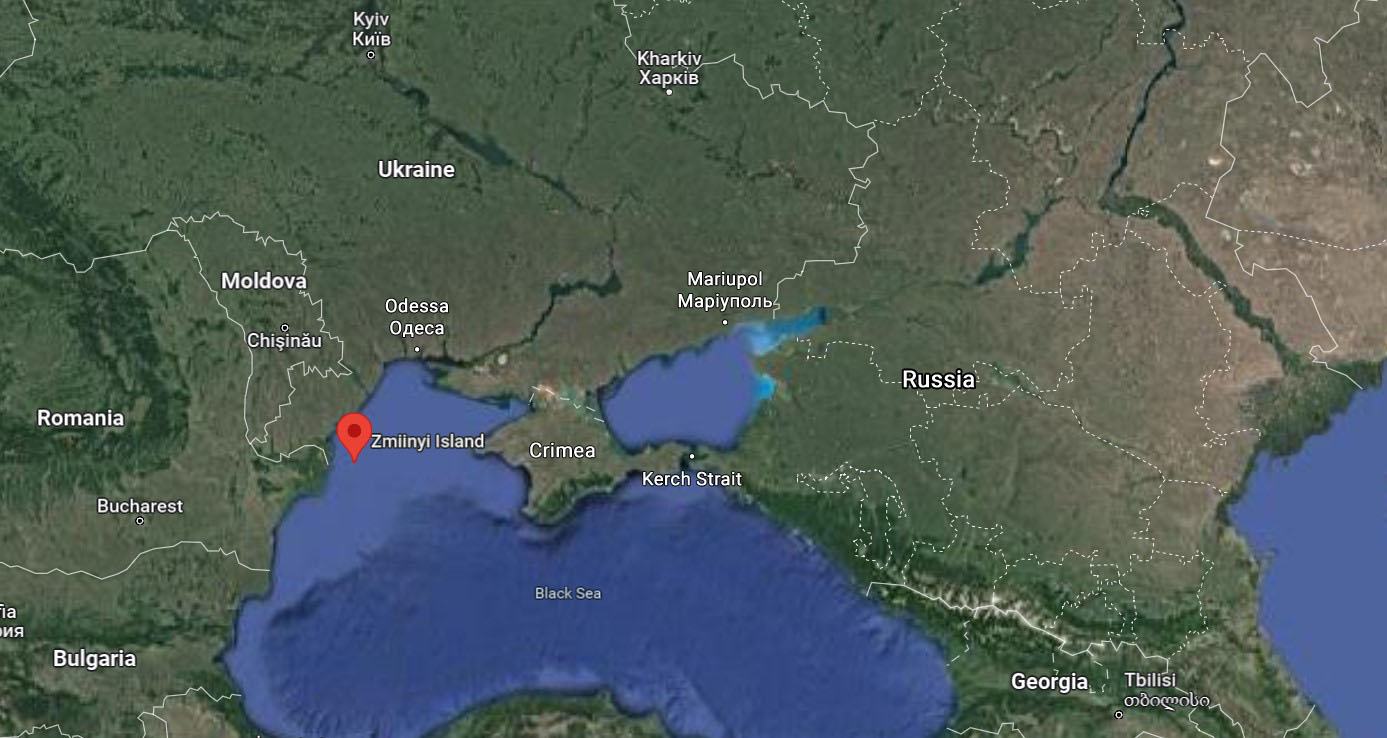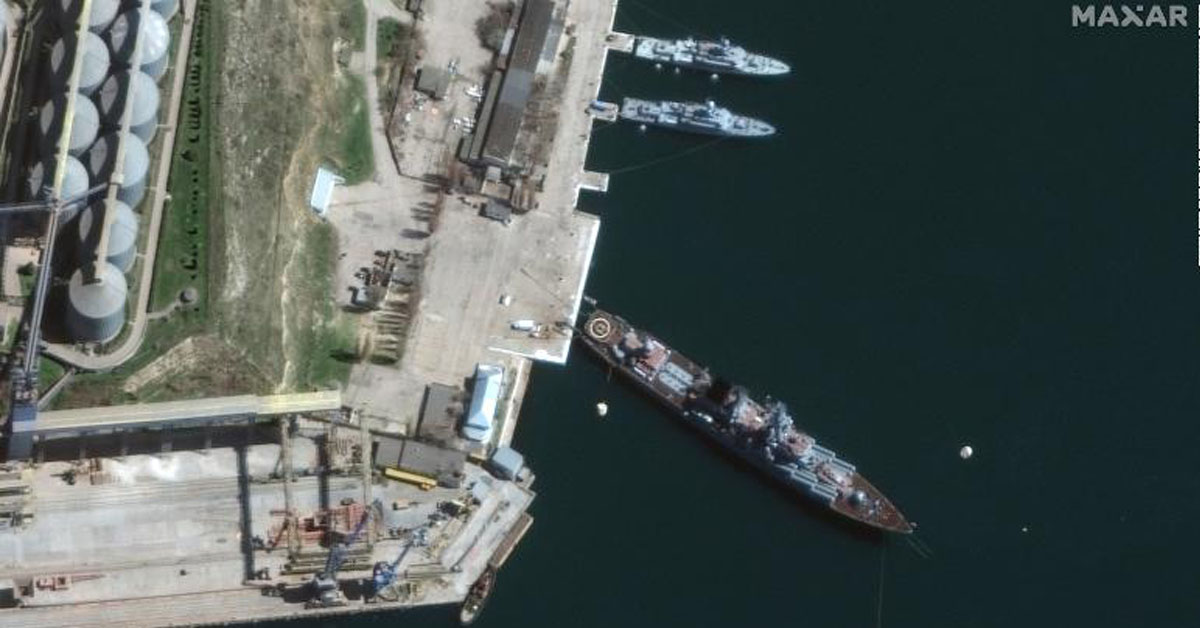It’s been 50 days since Ukraine has been plunged into war and destruction after Russian President Vladimir Putin ordered a “special military operation” on 24 Feb.
Ever since the beginning of the invasion, or perhaps after the Kerch Bridge connecting annexed Crimea to the Russian mainland was built, Moscow has, by and large, dominated the Black Sea and the Sea of Azov.

Geographically-speaking, the Sea of Azov is extremely important to Ukraine, since two out of five of its main ports, Berdyansk and Mariupol, coast along the Sea of Azov.
And with the shelling of Zymiinyi Island—an uninhibited strip of land that sit 50 kilometres away from the Ukrainian city of Vylkove and 50 nautical miles away from Russia—there are no longer any soldiers on lookout at the base, which gives Moscow full dominion over the Black Sea.
Sinking of Russian Warship Moskva
Ukraine made a significant counterattack by using a guided-missile anti-ship cruiser to sink Russian Warship Moskva.
According to the Russian state news agency TASS’ reporting, Moskva did indeed sink, but it was because ammunition on board had detonated, causing a fire to break out and damage the hull.
In addition to the stormy weather conditions, the ship lost its stability and sank. It’s currently being towed back to its port of destination.
Earlier the same day, Kremlin’s defence ministry stated that Moskva “remains afloat” despite the damages, and the crew has been evacuated to other Black Sea Fleet ships in the area.
Contrary to Russian sources, the Ukrainian Operational Command South claimed that Moskva had sunk because it was struck by Ukrainian Neptune anti-missiles.
The official statement reads, “In the Black Sea operational zone, Neptune anti-ship cruise missiles hit the cruiser Moskva, the flagship of Russian Black Sea Fleet – it received significant damage. A fire broke out. Other units on the ship’s ground tried to help, but a storm and a powerful explosion of ammunition overturned the cruiser and it began to sink.”
Which Side is Correct?
Though there is conflicting information, there are two objective facts: the ammunition on board had exploded and Moskva had sunk.
Thus far, it’s hard to deduce what actually damaged the ship.
One source familiar with the latest intelligence divulged that the US believes with “medium confidence” that Ukraine’s version of events is accurate, but they’ve yet to reach a definitive conclusion.
Pentagon Press Secretary John Kirby told CNN’s Jake Tapper that the United States (US) isn’t in any position to refute Ukraine’s version of events. It’s difficult to eliminate the possibility that they did hit the Russian Warship with a Neptune missile or other weaponry at their disposal.
Regardless, its loss will have a negative impact on the Russian navy and their national pride.
Whether its frame as an accident, incompetence, or a well-landed strike by forces source, none of the narratives sound palatable to the Russians.
And for the Ukrainian defensive forces, they can breathe slightly easier now that a major flagship has been taken off the nautical map.
The Significance of Moskva to Russia
To give an assessment of how importance Moskva is to the Russian Navy, retired US Navy Captain and Former Director of Operation at the US Pacific Command’s Joint Intelligence Centre, Carl Schuster, comments that the only other blow that could be worse or compare to the loss Moskva is if a ballistic missile submarine or Kuznetsov—Russia’s lone aircraft carrier—has been damaged.
Flagships may operate out of the public eye, but they are basically large floating pieces of national territory.
It’s precisely because of its nearly invisible and yet tangible importance that makes the attack such a strong symbolic and political message of opposition from Ukraine to Russia.
Moskva was a 186-metre-long (611 ft) warship, with approximately 500 men on board.
It’s the pride of the Russian naval service.
According to Naval-Technology, its history stretches back to the 1980s where it was originally commissioned by the Soviet navy and given the maiden name of Slava.
It was later renamed as Moskva in 1995 before it was refitted for service in 1998.
The massive warship was armed with a myriad of torpedoes, naval guns, close-in missile defence systems, and anti-ship and anti-aircraft missiles.
However, this also means that there is a massive tonne of explosive ordnance in its ammunition magazine. Any fire hazard nearby would be hard to deal with, given the limited options they have.
In the event of a fire, which objectively happened, Schuster lists out the grim options that the crew onboard has.
They could either flood the ammunition magazines and possibly render them unfunctional or abandon the ship completely.
There’s no Titanic situation where the ship cracks into half in the middle and slowly sinks to the bottom of the ocean; the sheer amount of ordnance blowing up all at once would cause a “catastrophic explosion” that will wipe out the entire crew on board.
The Significance of Sinking Moskva to Ukraine
As for Kyiv, this represents a huge advance and a zero-sum victory.
Interestingly enough, the Neptune was developed domestically based on the Soviet KH-35 cruise missile, a creation that was made functional by the Ukrainian forces last year.
It really does bring back reminders that while the arms race between the US and Soviet Union may have lasted decades, with neither side giving each other breathing space, the USSR typically fell short in terms of quality and made up with questionable quantity.
And that Russia and Ukraine both share the same military foundations before their separation in 1991.
If the Neptune missile was really utilised to attack Moskva, this would be the first recorded instance of Neptune being used in a war.
The Moskva also poses symbolic significance to Ukraine because it was one of the ships involved in the famous exchange on Zymiinyi Island in February.
At the very least, that is what Oleksiy Arestoyvch, an adviser to Ukrainian President Volodymyr Zelenskyy claims.
For a quick refresher, the Zymiinyi Island conflict, while short-lived and tragic, was a rallying cry for Ukraine as the 13 soldiers stationed there refused to surrender despite the insurmountable odds, leaving a memorable parting message of telling the Russian warship to “go f*** yourself” before they were shelled to death.
If that isn’t patriotism, I don’t know what is.

Vengeance may have arrived late, but it’s better than never.
On Thursday (14 Apr), Ukrainian Security Advisor Oleksiy Danilov said that the sinking of Moskva was a very important mission for his country’s military and promised that there would be dramatic actions.
It appears that Ukraine is starting to counterattack after weeks of being sieged.
Danilov offers more details, stating that Moskva had sailed close to Zymiinyi Island before it was attacked by two powerful Ukrainian-made missiles.
“(Putin) came to kill our children, our women, our civilians. That is our gift to him. And this is just the beginning. There will be more than one Moskva.”
US President Joe Biden was definitely right when he said that Putin underestimated Ukraine, thinking that they would roll over like Georgia.
Unfortunately for the autocrat, he met the tenacious Ukrainians.
Effects of the Attack on Moskva
On Tuesday (12 Apr), Lieutenant Commander Jason Lancaster, a US Navy surface warfare officer, analysed the entire sequence of events and posted it on the Centre for International Maritime Security.
He remarked that mobile shore-based cruise missiles like Neptune are bound to change the operational behaviour of the enemy Navy.
Typically, Russian ships “will operate in ways to minimise the risk of detection and maximise their chances to defend themselves”.
Moscow may hold dominion over the Black Sea, but they will have to be wary of cruiser missiles whenever they inch too close to land.
Since the Russian Navy is now being forced to switch their combat manoeuvres, it will limit Moscow’s ability to use their fleet to its fullest advantage.
He adds that the increased stress from sudden combat situations will also cause more fatigue for the crew and may lead to more mistakes.
In this two-and-half-month-long conflict, Moskva is the second large-sized Russian naval ship that Ukraine has sunk.
In late March, Ukraine asserted that a missile strike had destroyed a Russian landing ship at the docks of Berdyansk.
The war rages on.
Featured Image: Maxar Technologies



